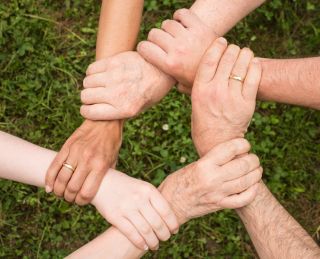Career
Flying in V-Formation: The Power of Personal Growth Groups
Personal Perspective: You can be responsible without having to go it alone.
Posted January 4, 2023 Reviewed by Davia Sills
Key points
- As a species, we’ve spent much of our developmental time in small bands, so being in small groups is deeply familiar to us.
- Group work demonstrates the role community can play in an individual's growth and healing.
- Personal growth groups can offer experiential rather than just expert advice.

“Don’t surround yourself with yourself.” — John Anderson, lead singer of Yes
The naturalist Milton Olsen once observed that when geese travel on their migrations, each bird flapping its wings creates an uplift for the bird behind it, and by flying in V-formation, the whole flock gets over 70 percent better mileage than if each bird flew solo.
When the lead bird, which doesn't benefit from these physics of cooperation, gets tired, it rotates to the back, and a new lead bird takes over. And if any goose falls out of formation, it's quickly reminded of the dynamics of drag and the importance of getting a little help from its friends.
The same logic—and power—applies to us. But when it comes to uplifting our own lives by joining with other birds of a feather, seeking growth and healing through group work, it's an acquired taste, especially for those of us who belong to what are called individualistic cultures (as opposed to collectivist cultures), ones that prize and prioritize self-reliance, uniqueness, personal initiative, and privacy—and underplay the role of interdependence and community.
Though you alone are responsible for your own life, this doesn't mean you have to go it alone.
And when you're ready to up your game—take new risks, step into your power, bump up your authenticity and how you show up in the world—you can't do much better than joining forces with kindred spirits in personal growth groups.
One iteration of this could be support or self-help groups that pull together for the primary purpose of helping people cope with life problems, such as medical or mental health conditions, addiction and recovery issues, divorce, grief, or weight loss (think 12-step groups, for instance). These peer-led and participatory groups typically offer participants ongoing support, both emotional and practical, a community of fellow seekers (or sufferers), and maybe most importantly, the been-there factor—people who've preceded you down the path you're stepping onto and can help you navigate it, offering experiential rather than just expert advice.
One of the most eloquent demonstrations of the power of the been-there factor was dramatized through a medical study conducted by the VA Medical Center in La Jolla, California. It revealed that pre-operative surgery patients who roomed with post-op patients healed faster and left the hospital sooner than those paired with other pre-ops like themselves. In other words, those who've "been there" are living proof that pre-ops can survive the surgery, and it translates to a healing function.
These groups could also be comprised of people who get together more for the sake of awakening, personal growth, and "consciousness raising"—such as men's and women's groups, dreamwork groups, mastermind groups for career advancement, leadership-development groups, communication and conflict-resolutions groups specializing in, say, non-violent communication (NVC) or authentic relating, public speaking groups, or what some people call personal boards of advisors.
I used to belong to one of these for a neighbor of mine who wanted to make a career transition. He pulled together half a dozen people from among his circle of acquaintances, and our job description involved three tasks: asking him questions, giving him feedback, and giving him homework, so that he was accountable to us the next time we met. And I was so impressed by the progress he made in less than a year that I started one of these groups for myself.
Some people call them "dream teams," and they're a terrific demonstration of the role community can play in the unfolding of an individual's sense of purpose and passion, growth and healing, and an embodiment of a famous experiment conducted in the 1960s by psychologist Stanley Milgram, called the "Small World Experiment." He showed that any two strangers in the U.S. could be connected to one another through only a handful of intermediaries, thus lending credence to the concept of "six degrees of separation."
I came early to my appreciation of the power of personal growth groups.
When I was in high school, I spent a fair amount of time in the principal's office for the kinds of reasons that more or less fell under the heading of "trouble at home." But it was in the principal's office that I met the school counselor who, among her various interventions on my behalf, invited me to join a group of fellow students who met in her office on Tuesday afternoons to talk about their lives and study their own behavior—an invitation I jumped at because I knew a lifeline when I was being thrown one.
She called it a T-group, which stood for training group, and by inviting me into it, she not only helped me open up a channel of communication with myself and helped un-isolate me but also kicked off a lifelong involvement in group work. Not a year has gone by since high school when I haven't been a member of some kind of group—men's groups, therapy groups, community-building workshops, NVC training, authentic relating workshops, personal growth retreats, even theater improv classes. Groups designed to immerse me—to educate me—in the how-to of self-awareness, communication skills, human relations, and what's abstractly referred to as being real.
Such groups also create safe zones where you can practice stretching beyond the limits you've set for yourself—or that have been set for you by family, gender, religion, or culture—into a zone of new possibilities. They do this by encouraging open, honest, and non-judgmental communication, encouraging participation, and having ground rules that allow for both speaking and being heard, rules that, unlike in everyday conversation, are both explicit and enforced. For example, one person talks at a time, everyone gets to talk, and there are no interruptions or advice given.
These groups are also likely to remind you how hungry you are—perhaps have always been—to be seen and heard and to be part of a pack. And we are pack animals, wired for tribal life, and as a species, have spent much of our developmental time in small bands sitting around campfires. Being in small groups is deeply familiar to us.
In fact, when we talk about "the law of the jungle," we usually mean ruthless and unrestrained competition, with everyone out solely for their own advantage. But the phrase was coined by Rudyard Kipling in The Second Jungle Book, and he meant something very different. His law of the jungle is a law that wolves in a pack are supposed to obey. His poem says, "the strength of the Pack is the Wolf, and the strength of the Wolf is the Pack," and it lays out the basic principles of social cooperation, which is an admirable mixture of individualism and collectivism.
In our case, this often requires that individuals reach out to the collective for the strength they need. Years ago, I interviewed Richard Bolles, who wrote What Color is Your Parachute, probably history's best-selling book about job hunting and career change. And when the conversation turned to the subject of self-employment, he said that self-employed people could hire out just about any skill, even discipline. You can get someone to call you every week and help keep you on track. But the only trait you can't hire out, he said, and without which you'll "die on the vine," is the willingness to ask for help. Being self-employed or ruggedly individualistic doesn't mean you're out there all by yourself, and resourceful people gather their resources, send for provisions, and join forces. To some degree, success in life is a numbers game, and we're after the kind of momentum bred by a team effort, the sometimes considerable energy needed to escape the gravity of inertia and self-doubt.




